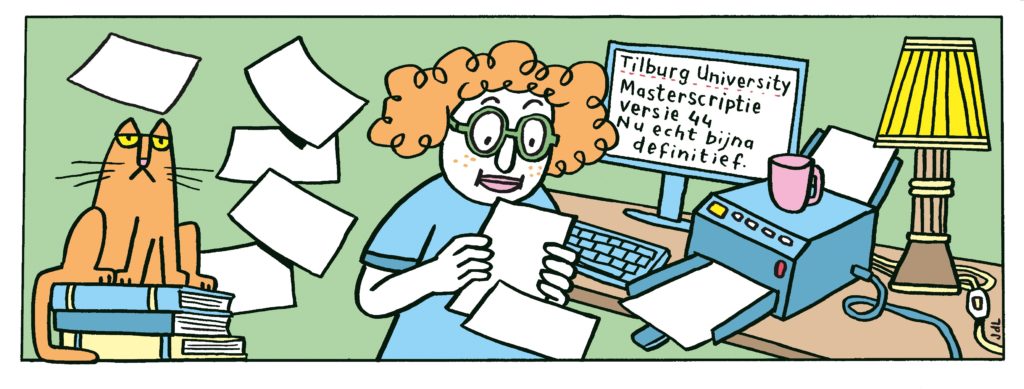Hannah van den Bosch: ‘Excessive positivity does not help to solve the climate crisis’
A literature review, experimenting in the lab, or working with SPSS? Tilburg University students write a wide variety of theses. In the section Master’s Thesis, Univers highlights one every month. This time: five questions for Hannah van den Bosch. She studied philosophy and wrote a thesis about ‘eco-grief’: an emotion caused by the current climate crisis and the rapidly changing world.

Where did the inspiration for your thesis topic come from?
“In late 2019, I had to choose a thesis topic. At that time, millions of animals were affected by the wildfires then raging in Australia, including more than 60 thousand koalas. Those animals were constantly on the news and in the media, they became the symbol of the fire. Every time I looked at it, I had the same thought, “This is because of us; this is because we humans are not doing enough to combat climate change.”
“Coincidentally, I had just then read about the subject of ‘eco-grief, also known as ‘climate grief.’ The description of that phenomenon matched exactly what I felt when I saw the koalas: sadness, despair, and anger at the fact that a habitat and the animals in it are being destroyed by climate change and that this is irreversible. I wanted to do something with that.”
What did you research?
“I looked at how society reacted to eco-grief, and how we can interpret those reactions philosophically. Climate grief is often seen as something you have to get over quickly. Just as with ordinary grief: give it some thought, live through it, and then you’re over it again. Eco-grief is also seen as a private problem; it’s individual and not something that concerns the whole of society. In fact, the sooner you pull yourself together again, the sooner you can rejoin society.
“For the philosophical interpretation of these reactions to climate grief, I did a literature search: what have other philosophers already written about the subject, and is that sufficient? That turned out not to be very much: eco-grief is a recent phenomenon and not much is known about it yet. But I did find points of departure in ecofeminism. This observes a parallel between the oppression of minorities and women by patriarchal systems, and the oppression of the climate and animals by man.”
(text continues below the image)

What were your most striking observations?
“The disapproving reactions to eco-grief always, in my opinion, do not do justice to the emotion. However, the reactions can be divided into two categories of injustice. The first is a lack of sharing knowledge. When people deny that eco-grief is an appropriate response to the current climate crisis, they deprive those who experience it of a platform. As a result, the two groups do not reach each other.
“In addition, those who experience eco-grief are often dismissed as ’too emotional.’ They are supposed to be just angry or sad, negative emotions that are demotivating in the fight against climate change. Many people who respond to eco-grief have a rational point of view, which they say would be much more effective and better to solve the climate crisis. But what they don’t realize is that this excessive positivity, based only on rationality, doesn’t really help either.
“Eco-grief does, in my opinion, evoke a greater drive to act in those who experience it than a rational approach alone can. If you dare to admit that climate change affects you emotionally, you are more likely to actually do something about it.”
What do you hope people will learn from your thesis?
“People around me said, ‘How nice that there is a word for this.’ They recognized themselves in the experience of eco-grief because they constantly receive bad reports from the media about the climate crisis. Whether they then want to talk about it or not, that’s personal. But if more people dare to admit that they are concerned about the planet, the future, and the next generations, it may encourage them to take a little better care of the planet.”
Do you have any tips for aspiring thesis writers?
“First of all, be honest with your supervisor. It’s not bad or embarrassing if you get stuck once in a while, or if you don’t see the point anymore. My supervisor reacted very well to that in any case, she gave me good support at times like that.
“It’s also good to talk a lot with friends and fellow students about your subject, it prevents you from getting lonely. A friend of mine was working on her thesis at the same time as me, and she really became my buddy. We would ask each other how certain chapters were going, and whether we had made any progress. That was nice encouragement.”
Master’s thesis
Title thesis: Grieving nature in a time of climate change
Author: Hannah van den Bosch
Grade: 9
Supervisor: Amanda Cawston (TSHD)
Translated by Language Center, Riet Bettonviel






